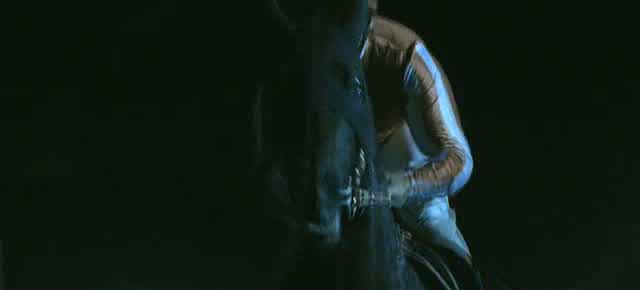Reżyseria:
Paolo SorrentinoScenariusz:
Paolo SorrentinoZdjęcia:
Luca BigazziMuzyka:
Teho TeardoObsada:
Toni Servillo, Anna Bonaiuto, Flavio Bucci, Carlo Buccirosso, Giorgio Colangeli, Fanny Ardant, Piera Degli Esposti, Nuot Arquint, Massimo Popolizio (więcej)Opisy(1)
Boski to fascynujący filmowy portret Giulio Andreottiego, jednej z najbardziej niezwykłych postaci XX wieku. Związany z chrześcijańskimi demokratami, Andreotti był głównym rozgrywającym na włoskiej scenie politycznej, przez lata pełniącym różne funkcje w rządzie Italii: był ministrem w kilku rządach, trzykrotnie powierzono mu tekę premiera. Wytrawny polityk i człowiek zagadka, potrafił lawirować pomiędzy stawianymi mu zarzutami ze strony mediów i mimo wielu procesów utrzymać się na powierzchni. (Against Gravity)
(więcej)Materiały wideo (1)
Recenzje (6)
With this movie Paolo Sorrentino left the impression of an almost perfect director on me. His work with the camera, sound, music, story, characters and actors is almost genius. That’s one of the reasons why I kept watching a movie that is not my cup of tea at all until the end. It’s not my cup of tea because it’s incredibly difficult to understand. The Italian mafia, or rather the political scene, is extremely broad and it’s hard to pay attention to every character that appears. On the other hand, you get a picture of Italy and the practices of their politicians, which don’t just revolve around one person, but across several areas. Crazy. You can’t help but be surprised with all the things that happened there in that time, and it amazes me all the more that the Italians are capable of filming such story about themselves. Hats off. I didn’t give this the full number of stars only because I had troubles keeping track of all those different people. But it would certainly be better if I watched it for a second time.
()
If someone feels that their political scene sucks and is drowning in corruption and petty intrigues, they should watch this film, which will probably rid them of any illusions about the so-called civilized West. The film portrays the late years of Italian Prime Minister Andreotti's reign, who shaped the face of Italy in the second half of the 20th century as a politician, while also focusing on his downfall and attempts at political survival. It is said that political films are usually boring, but from the first moment, the director makes it clear that in Andreotti's case, there are so many dark motives and bloody events that there simply won't be time for any boredom. From the first minutes, the film sets a fast pace, dynamic editing, remarkable camerawork, and various elements that grab your attention, such as titles introducing individual chapters and characters of the story. Moreover, assassinations, strange suicides, and intrigues abound in the film. The screenwriter did not have to embellish anything; he relied only on newspaper headlines and generally known facts. The depiction of the character of the seven-time prime minister and a key figure in the Italian political system, Andreotti, is a bit more complicated. In terms of maximum demonization, he is portrayed as a combination of the Egyptian Sphinx, Nosferatu the vampire, and Joseph Stalin. His nearly autistic face and emotionless behavior would hardly secure such an important position for him in a democratic system. In reality, such a politician needs a lot of empathetic behavior and social intelligence. Extroverts have an advantage. When the director introduces Andreotti's faction, the viewer, thanks to the selected details in the characters' behavior, gets the feeling of encountering a mafia gang or the Moscow Politburo from the first moment. The true highlight of the film is the dialogue, often maximally cynical and revealing the thought processes of those involved. It is precisely because of the dialogue, but also because of the incredibly interesting soundtrack, where classical music provocatively mixes with rock music, and the final credits are accompanied by the Latin American group Molotov, that I give this film five stars. It's not a perfect film, as the screenplay occasionally loses its grip in the second half, but considering the content and execution, it is at the forefront of its genre. Overall impression: 90%.
()
A lot of people – among whom it is hard to keep track of who is who – carry on a two-hour discussion. And it is a gripping spectacle. Giulio Andreotti, a divine devil, narcissistic stoic and political mummy, knows how to hold on to power. Instead of imagination, he uses an immense archive. Paolo Sorrentino takes a respectful and detached view of him. He pays particular attention to the microscopic aspects of Andreotti’s life, those barely perceptible moments when he shows his humanity. These moments are not completely non-existent, but they are so rare that the politician superbly “serves” the director as a timeless and impenetrable metaphor for power (and behind that façade is…nothing?). Though inspired by an actual person, the film version of Andreotti remains a more mysterious personality than Charles Foster Kane (instead of Rosebud, here we have the very unsatisfying Tedax). The camera repeatedly approaches the darkly comical Toni Servillo, capturing him from multiple angles in a single dialogue scene, always finding him in a larger group of people so that he serves as the focal point of the picture. Points of view both converge on him and emanate from him. The distance from the protagonist makes room for Italian politics as such – the director’s inestimable ability to make light of the deadly serious becomes most apparent here. That’s not even to mention the content, which probably won’t captivate anyone who is not familiar with Italy, but in terms of form, there is not a single boring scene in the film. Acrobatic camerawork, an unexpected mix of modern and classical music, changes in narrative style and mood depending on which layer of the protagonist’s personality (or rather the Italian political scene) that the director decides to reveal to us, visual gags…. You would almost believe that the haggling of our local political dinosaurs would be just as entertaining if seen through the eyes of this competent director. It’s hard to avoid using the worn-out and – in the context of politics – very rarely uttered word “cool”. But Il Divo is seriously cool. 85%
()
Fantastic directing – captivating tempo, camera dynamics, exclusive music selection, mood equilibristics. Great actors and above all a current topic. Unfortunately, Il Divo requires a sufficiently informed viewer, because it fires out the names of the target with the cadence of a machine gun and the orientation in Andreotti's case is extremely distressful. It was my own fault that I didn't enjoy the film as much as I could have - I found myself not being able to keep up with the story. All that remains is to study and watch Sorentino's film again. It has enormous experience potential comparable to the phenomenal political drama Frost/Nixon.
()
Impassiveness through pulsating tempo. Irony through silence and furtive gestures. A study of a man whose internal motives we know almost nothing about. If you know your way around the political scene in Italy at the beginning of the nineties, you will probably enjoy this more than I did. I don’t intend to hide the fact that I was expecting something completely different - concentrating on Andreotti’s career as such with a particular focus on the events of spring 1978 and spring 1979. This is more of a “made by an Italian for Italians" affair.
()
Galeria (20)
Photo © Indigo Film



Reklama